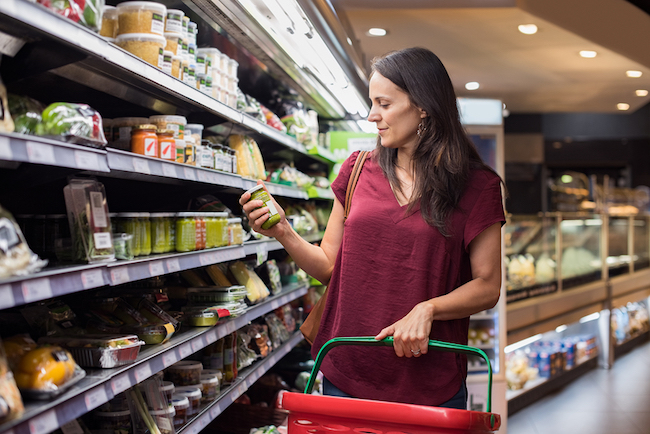
Amid Booming Sales, the USDA Organic Seal is Taking a Hit and the Industry Fails to Communicate its Message
Total organic fresh produce sales were up 22% for the month of March.
In May, Thrive Market’s CEO Nick Green told the New York Times that his company was experiencing a level of demand that it was expecting to see in 2022 or 2023.
Some organic brands received such big orders that they have had to ration products to retailers.
With COVID-19 and incredibly brisk sales garnering all of the attention, getting lost in the conversation is what has been happening to the integrity and strength of the USDA organic seal.
In the 2020 U.S. Grocery Shopper Trends report released by The Food Industry Association, it was found that organic claims on the label became less important over the last year.1
2019 — When purchasing food, product claims that shoppers are seeking:
33% – No artificial ingredients
32% – No preservatives
27% – No trans fats
27% – Not bioengineered
25% – Natural
19% – Certified organic
11% – Gluten-free
2020 — When purchasing food, product claims that shoppers are seeking:
28% – No preservatives
28% – No artificial ingredients
25% – Natural
23% – Not bioengineered
22% – No trans fats
17% – Certified organic
13% – Gluten-free
Given that organic is the superior label, combined with the growth of the industry, many executives would have expected that the above percentages to increase, not shrink.
The Hartman Group, an independent research organization that has been studying American food and beverage culture for more than 30 years, recently published Organic and Beyond 2020, a comprehensive analysis of the sector. Its CEO, Laurie Demeritt, presented the following findings from her organization’s report in a webinar last month:
– Despite the fact that the USDA certified organic seal also stands for Non-GMO, only 45% of consumers connect organic with being GMO-free.
– Some consumers feel that organic standards have been weakened.
– While organic is still very important, there are indications that organic isn’t representing everything that consumers are seeking anymore. They are seeking more in three main areas — animal welfare, social welfare (workers’ rights) and soil health.
– 78% would prefer more stringent animal welfare requirements for USDA organic certification.
It may be easy to dismiss concerns about standards and what organic represents to consumers because sales of organic have been so incredibly strong as of late.
But sales of conventional, highly processed cookies and crackers, such as Oreos, have also been exploding. So, almost every food category seems to be doing well.
Yet, these two reports are telling us a few important things.
First, the USDA organic seal is losing some of its credibility and appeal among consumers — something that no one in the industry wants to see.
This should come as no real surprise, however, to Organic Insider readers. We have been discussing numerous problems with the USDA’s National Organic Program over the last few years, including the illegal allowance of hydroponics in organic, organic “factory farms” being tolerated, fraudulent imported organic grains, the elimination of new organic animal welfare standards, and the USDA failing to finalize an origin of livestock rule, which is decimating small organic dairy farmers.
Second, the data continues to show that the value of organic is not being conveyed to the consumer. This is an issue that the industry has wrestled with for many years and has yet to resolve. As a result, organic brands are missing out on potential revenue opportunities, and consumers end up making less-informed decisions.
But our inability to impart the value of organic to shoppers now has much more serious implications.
While some companies have been communicating the importance of consuming organic, clean, immune-boosting foods to help people protect themselves during COVID-19, there has not been any type of nationally coordinated campaign focused on this.
And with our daily food choices so critical to our livelihood, the industry has not been a leader or voice of clarity as to why organic is an essential part of the solution.
If there were ever a time that consumers should be eating organic, it is now.
But the American people are simply not getting the message.
—
(1) This data was taken from a survey conducted in February 2020. Yet, the same report said that 85% of shoppers say they have not changed how much scrutiny they give to product labels during COVID-10. So, the numbers would not be meaningfully different due to COVID-19.
 |
With gratitude, 
Max Goldberg, Founder |
Quick Hits
* Great story! The UC-Irvine professor who went back to Africa to create a zero-waste, regenerative agricultural movement.
* Dr. Bronner’s now sources 100% of the organic hemp seed oil in its soap and other products from U.S. farmers.
* Congrats to Ashley Walsh for the opening of Pocono Organics, a USDA certified organic market, café and 381-acre farm in Pennsylvania.
* Rodale Institute’s annual Organic Field Day will now be an online, multi-day event from July 13-17.
* A woman in San Diego is raising Monarch butterflies in her backyard.
* This Friday, former NBA star John Salley is opening his new vegan restaurant in Los Angeles called Cafe Organix.
* The Healthy Hive Foundation, an organization to help save the bees and started by the 15-year old founder/CEO of Me & the Bees Lemonade, Mikaila Ulmer, has announced new research about the bee population from work done at San Francisco State University.
* North Coast Organics has collaborated with The Grateful Dead on a certified organic deodorant line.
* A catering company in British Columbia, Canada is pairing organic food with cannabis.
* The world’s #1 restaurant has created an entirely new menu centered around the pillars of biodynamic farming.
Sustainability Spotlight -- Numi Tea

As the co-founder of OSC² (One Step Closer to an Organic and Sustainable Community), a community of sustainably-focused natural products industry CEOs and business leaders, Ahmed Rahim is constantly looking to break new ground when it comes to environmentally-friendly packaging.
His latest innovation is a new compostable, plant-based tea wrapper for Numi Tea, a company that he started with his sister Reem Hassani and where he serves as its CEO.
Developed in collaboration with the OSC² Packaging Collaborative, the wrapper features a thin, Non-GMO PLA layer made from renewable sugarcane and a thin layer of metalized eucalyptus. It uses Forest Stewardship Council® certified paper grown in Scandinavia, which guarantees no eco-toxicity when it breaks down, and is commercially compostable (ASTM D6868 compliant — the U.S. test for industrial compostability).
For over ten years, Numi had been looking for an airtight flexible film seal that did not include petroleum-based materials. This innovation has not only eliminated plastic waste and is made from renewable resources, but it has paved the way for other brands to benefit from increased access to plant-based flexible film.
In addition to this new wrapper, Numi utilizes 90% post-consumer waste recycled cardboard, soy-based ink and no shrink wrap for its tea boxes. Its tea bags are made from biodegradable, unbleached, Non-GMO Abaca fiber, and its tea tags are made from 100% recycled material, printed with soy-based inks.
“Creating compostable tea wrappers has been a goal for our business since we launched Numi 20 years ago. The journey has been filled with many obstacles and challenges, but we landed on a solution that uses renewable, earth-to-earth materials and one that will move the industry away from our dependence on petroleum-based plastic,” said Ahmed Rahim.
From a pool of over 1,000 nominations, Numi’s new tea wrappers were also selected as a NEXTY Finalist for exemplifying innovation, inspiration and integrity in packaging.

Weekly News Summaries


Sales of Organic Fresh Produce Grew 16% in May
Organic fresh produce sales continue to grow at a very rapid rate, with bananas as the dominant category for volume growth.
Bayer Settles Monsanto's Roundup Cancer Lawsuits for up to $10.9 billion
By Ludwig Burger
The German drugs and pesticides maker has come to terms with about 75% of the 125,000 filed and unfiled claims overall.
Court Judges Deny Immediate Halt to Dicamba Use
By Dan Nosowitz
This ruling means that millions of pounds of the super-toxic dicamba could still be used this year.

KeHE names 16 On Trend Awards Winners
Out of over 120 brand submissions, KeHE named Miyoko’s Creamery’s Cultured Vegan Butter Made with Oat Milk as Best of Show.


Organic Farmers Association Calls Out USDA for Letting Down Organic Dairies
The USDA has missed the Congress-mandated deadline to finalize the very important Origin of Livestock rule.
Food Inequality Crisis Deepens in U.S. Under Pandemic’s Pressure
By Catarina Saraiva and Dave Merrill
Roughly 17 million more people will become food insecure in 2020, bringing the total to 54 million, including 18 million children.

Dicamba is Damaging Trees across the Midwest and South
By Jonathan Hettinger
The supertoxic herbicide is causing widespread damage to trees, native plants and natural areas across the Midwest and South.


17 Groups Pile on FDA, Congress, White House to Regulate Hemp CBD
By Todd Runestad
Trade groups, consumer advocates and law firms are urging an end to the regulatory uncertainty.
U.S. Court Blocks California Cancer Label on Bayer's Roundup Weedkiller
By Tina Bellon
A big setback for consumer transparency.
Want to share this newsletter on social media? You can use this link: Newsletter Link
The material in this newsletter is copyrighted and may be reprinted by permission only. All requests must be in writing. Please use our contact form to request republication rights.
Newsletter Archive
Quick Hits
* Great story! The UC-Irvine professor who went back to Africa to create a zero-waste, regenerative agricultural movement.
* Dr. Bronner’s now sources 100% of the organic hemp seed oil in its soap and other products from U.S. farmers.
* Congrats to Ashley Walsh for the opening of Pocono Organics, a USDA certified organic market, café and 381-acre farm in Pennsylvania.
* Rodale Institute’s annual Organic Field Day will now be an online, multi-day event from July 13-17.
* A woman in San Diego is raising Monarch butterflies in her backyard.
* This Friday, former NBA star John Salley is opening his new vegan restaurant in Los Angeles called Cafe Organix.
* The Healthy Hive Foundation, an organization to help save the bees and started by the 15-year old founder/CEO of Me & the Bees Lemonade, Mikaila Ulmer, has announced new research about the bee population from work done at San Francisco State University.
* North Coast Organics has collaborated with The Grateful Dead on a certified organic deodorant line.
* A catering company in British Columbia, Canada is pairing organic food with cannabis.
* The world’s #1 restaurant has created an entirely new menu centered around the pillars of biodynamic farming.
